New GM/sales director Mark Williamson and assistant GM/controller Ian Spalding will guide Bradford White Canada’s future success as plumbing and HVAC industries continue to evolve Bradford White Canada, an industry-leading manufacturer of water heaters, boilers and storage tanks and a subsidiary of Bradford White Corporation, announces two senior sales and management promotions as part of the company’s ongoing Read more
Plumbing

New GM/sales director Mark Williamson and assistant GM/controller Ian Spalding will guide Bradford White Canada’s future success as plumbing and HVAC industries continue to evolve
Bradford White Canada, an industry-leading manufacturer of water heaters, boilers and storage tanks and a subsidiary of Bradford White Corporation, announces two senior sales and management promotions as part of the company’s ongoing commitment to quality and outstanding service as the plumbing and HVAC industries evolve.
Mark Williamson has been named general manager/sales director for Bradford White Canada. Ian Spalding has been named the company’s assistant general manager/controller.
“Mark and Ian’s resolve, dedication, cooperative spirit, and customer focus have been apparent as our industry has met the challenges of the last two years,” said Jim McGoldrick, senior vice president of sales for Bradford White Corporation. “They have demonstrated the right combination of experience and innovation to guide our Bradford White Canada team through the coming months and years while continuing to support a culture based on communication, collaboration, and customer service.”

Mark Williamson (left) has been named general manager/sales director for Bradford White Canada. Ian Spalding (right) has been named the company’s assistant general manager/controller.
Williamson, a sales leader with more than 30 years of experience in industrial and consumer goods industries, joined Bradford White Canada in 2017 as national sales manager. Most recently, he served as the company’s director of sales and marketing.
Spalding has more than 30 years of experience in manufacturing finance. He has worked at Bradford White Canada as controller since 2000.
For more information about Bradford White Corporation, visit https://bradfordwhitecorporation.com.
For more information about Bradford White Canada, visit https://bradfordwhitecorporation.com/bradford-white-canada/.

Georgia Tech Scheller College of Business to Co-Host March Workshop on Business Cash Flow Management The Home Depot® is launching a series of virtual workshops designed to help Pro contractors manage and grow their businesses. The retailer is hosting free, interactive livestreams offering expert lessons taught by industry experts. The workshops will run every other month Read more
Georgia Tech Scheller College of Business to Co-Host March Workshop on Business Cash Flow Management
The Home Depot® is launching a series of virtual workshops designed to help Pro contractors manage and grow their businesses. The retailer is hosting free, interactive livestreams offering expert lessons taught by industry experts. The workshops will run every other month.

Built exclusively to help Pros run their businesses more efficiently and profitably, each virtual workshop takes a deep dive into topics that Pros want to hear. Themes include best practices in social media for business, managing business expenses, home improvement industry trends and more.
The March 8th workshop “Money in. Money Out. Manage Your Cashflow to Boost Your Business’ Success” is focused on managing expenses and maximizing net operating income. Dr. Jonathan Clarke from The Georgia Tech Scheller College of Business and The Home Depot Credit team will discuss cash flow management tips to boost business success.
The Home Depot began its in-store workshop programs in 1997 with the launch of its Kids Workshop program. Currently, there are three different virtual livestreams for DIYers including Homeowner 101, DIY Workshops and Seasonal Workshops.
In addition to the new Pro Virtual Workshops, The Home Depot helps Pros through its Pro Xtra™ loyalty program which offers members-only benefits including credit offerings, volume pricing, exclusive product offers, paint rewards, perks and more.
Pro contractors with a Home Depot Pro Xtra membership can register for upcoming workshops by visiting https://www.homedepot.com/c/pro_workshops.
For more information on Pro Xtra, visit www.homedepot.com/ProXtra or by visiting the Pro Desk at a local Home Depot store.

By sharing Starr Delgado’s, Kim Yeagley’s and Anna Pearson’s stories, RWC aims to highlight more diverse perspectives in plumbing. Reliance Worldwide Corporation (RWC) is a leading manufacturer of premium branded plumbing products, valves, secondary pipe supports, fire-stopping solutions, DWV testing and fluid control technologies for residential and commercial applications. Women in Construction (WIC) Week, originally founded Read more
By sharing Starr Delgado’s, Kim Yeagley’s and Anna Pearson’s stories, RWC aims to highlight more diverse perspectives in plumbing.
Reliance Worldwide Corporation (RWC) is a leading manufacturer of premium branded plumbing products, valves, secondary pipe supports, fire-stopping solutions, DWV testing and fluid control technologies for residential and commercial applications.
Women in Construction (WIC) Week, originally founded in 1953 by the National Association of Women in Construction (NAWIC), was created to support women working in the industry. The week has grown over the years, successfully amplifying women’s voices to the point where many construction and manufacturing companies have also turned their attention to celebrating and supporting women in the trade. RWC is one of them.
“By supporting women in construction, we can create a more inclusive industry and attract new talent to fulfill the increasing number of open positions within the trades,” said Emily Connell, Director of Brand Marketing & Communications for RWC Americas. “RWC and its family of brands understand the importance of supporting diverse talent, including women, especially within the plumbing trade.”
Plumbing professionals, such as Starr Delgado, Kim Yeagley and Anna Pearson, have been overcoming plumber stereotypes for years. Emily Connell
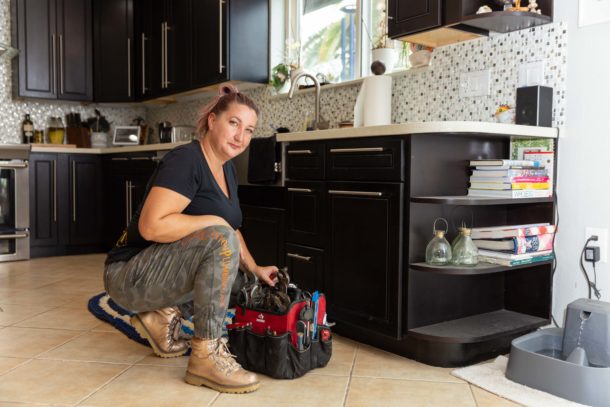
Yeagley, the owner of Gold Canyon Plumbing in Arizona, has been in plumbing for 15 years.
“At first, I wasn’t sure how guys were going to accept me,” she said. “People doubt that I know my plumbing, but once I start talking shop, that’s how I win everyone over.”
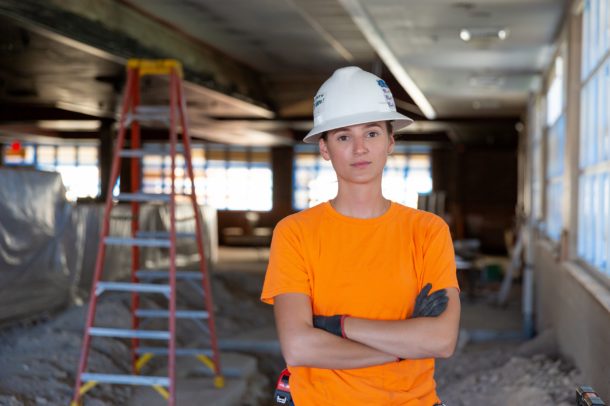
Pearson, a plumbing apprentice at A-Better Plumbing in Las Vegas, wants to show the world that plumbers are all sorts of different people from various walks of life. To help demonstrate that, she uses her social media platforms, where she’s affectionately known as the Plumbing Princess, to document her journey and promote the plumbing trade.
“Genuinely, I want people to join the trades,” Pearson said. “I want it to be a growing industry again.”
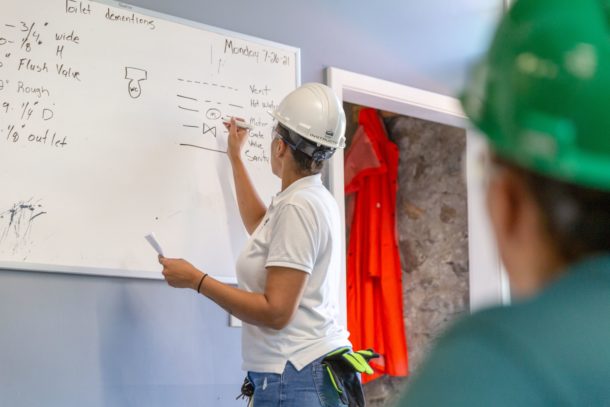
Delgado, a plumbing instructor at HBI Job Corps Plumbing Program in North Grafton, Massachusetts, offered advice to women looking to enter the trades.
“There’s always going to be challenges for women in the field,” she said. “People are always going to say, you can’t, you shouldn’t or don’t, but if you say, ‘I’m going to, I can and I will’ and stay focused, you can do it. You just have to have some thick skin. Being a plumber is an amazing career to be in.”
RWC is doing its part to support women in plumbing by showcasing their talent and sharing their stories. The company plans to continue sharing similar stories to reach and inform the younger generation and diverse talent pools, in hopes that they begin to see the opportunities of pursuing a career in the trades.
“We will keep supporting women in plumbing by giving them a platform to share their stories,” Connell added. “We need to hit the labor shortage head-on, and we can do so by ensuring everyone feels welcome in the trades and by defeating common stereotypes associated with plumbers. Part of achieving that includes telling authentic stories, changing people’s perception of the trade and helping to create a more inclusive environment.”
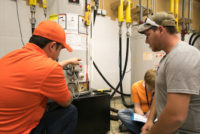
Plumbing is one of the most lucrative trades. You can make a great income from it. However, those looking to make big money should consider starting plumbing businesses. These help you get out of the wage labor cycle and allow you to leverage the productivity of others. In this post, we take a look at Read more
Plumbing is one of the most lucrative trades. You can make a great income from it. However, those looking to make big money should consider starting plumbing businesses. These help you get out of the wage labor cycle and allow you to leverage the productivity of others.
In this post, we take a look at how to build a fantastic plumbing business from scratch. Here’s what you need to do:
Find Your Specialist Area
The first step is to find your specialist area – the thing in plumbing that you do better than everyone else. For instance, you could be your city’s leading provider of:
- Drain unblocking services
- Toilet unblocking services
- Commercial piping
- Water tank and gas boiler installation
- Pipe cleaning and servicing
- Pressure monitoring
- Diagnostic plumbing
- Bathroom renovations
Once you know what you want to focus on specifically, you can start to create a name for yourself. Customers don’t just want general plumbers – they want people who can solve the specific issues that they face right now.
Get Educated And Start Working
The next step to building a rockstar plumbing business, like Inner West Sydney emergency plumbing and get deep into the understanding of your trade. The more you can learn about it, the more successful you will be.
If you want to focus on a specific area of plumbing, then it makes sense to work with someone who already operates a business in that field. They can show you the ropes, so to speak, so that you know how to build your own business in the future.
It doesn’t have to be a long slog. You don’t have to work for an existing plumbing firm for very long. However, you do want to pay attention to how they operate and the structures they put in place to make money. Then, once you’re ready, all you need to do is leave and copy their methods.
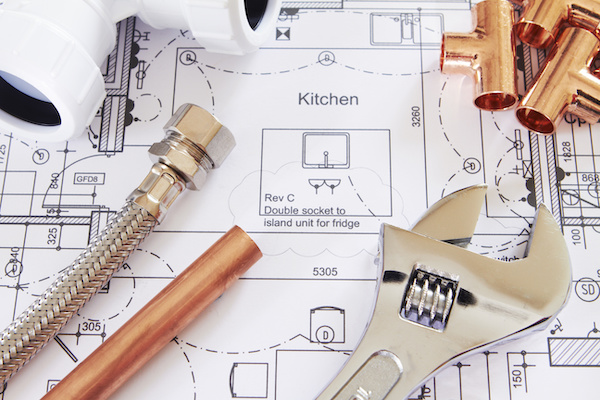
Sort Out All The Legal Stuff
When setting up a plumbing company, you’ll need to decide on a formal business structure, usually LLC or LLP, and then register with the tax authorities. Only complete your registration if you are about to trade. If you are not ready to trade, don’t register, as you will face various reporting and compliance requirements.
Write Your Business Plan
Most plumbing companies launch head-first into the industry without a real plan for how they’re going to make money and be successful. Generally, speaking, this is a bad idea. You need a document somewhere to remind you what you’re going for and what you would like to achieve.
When creating a business plan, include both inspirational and practical elements. For instance, if you want to generate $1 million in revenue, state that as an objective and also write down what you need to do to get there.
Hire The Right People
As a plumber, there’s a limit to how much you can earn working for yourself. No matter how skilled you become, or what hourly rate you charge, there’s a limit to the number of hours in the day.
However, when you hire other people, it changes the dynamic. All of a sudden, you’re able to sell their services too, creaming the surplus off the top for yourself.
It all depends on hiring the right people, though. If you employ the wrong colleagues, it’ll harm your brand and you won’t be able to grow as fast as you like. In some instances, your company might actually shrink.
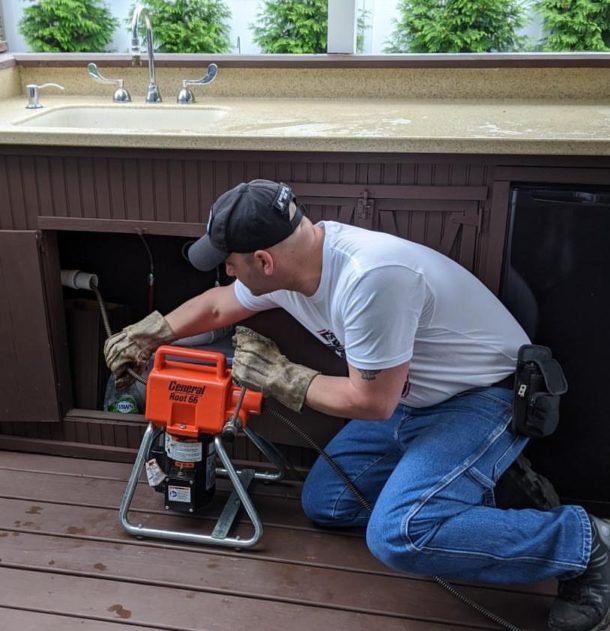
Streamline Management
Managing field employees is notoriously challenging. However, these days there is more technology than ever before to make it happen.
Explore employee scheduling best practices. Make sure that people know when they are supposed to work, and where.
Also make sure that you remain in regular contact with those in the field. Offer them feedback from clients, and then ask them to rate how much they enjoyed working on a particular task.
If hiring contractors, not employees, use software that allows them to pick and choose the jobs that they take on. Also, get solutions that allow you to pay them directly for the work that they do so you can avoid clunky payroll software.
Reduce Your Expenses
While growing revenues is important in plumbing businesses, so too is reducing your expenses. Cutting them by just 10 percent can have the effect of making your business more than twice as profitable.
For instance, suppose that you reduce costs from 90 percent to 80 percent of revenue. Your profits jump from 10 to 20 percent – a doubling. Cutting costs could involve setting up your office from home or using cheaper, more effective marketing services.

We recently asked some of the major players in the phvac markets to give us their feel of how the economy, supply chain, etc. plays out for 2022. We caught up with Bradford White’s Bruce Carnevale, president and CEO, and here are his thoughts on the rest of the year and beyond. MH: We’ve all experienced Read more
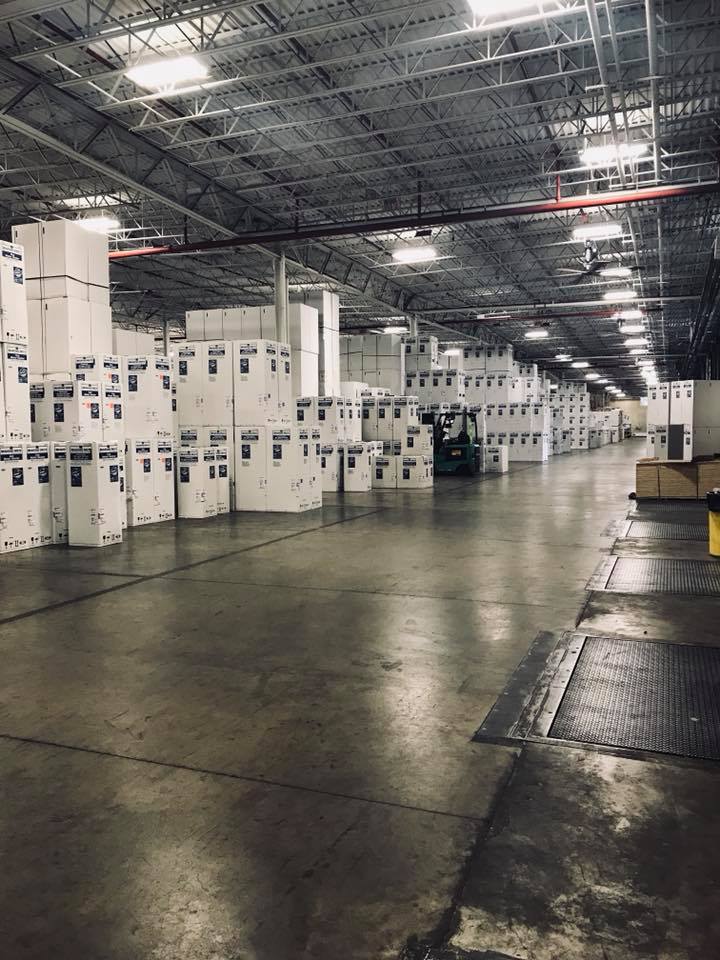 We recently asked some of the major players in the phvac markets to give us their feel of how the economy, supply chain, etc. plays out for 2022. We caught up with Bradford White’s Bruce Carnevale, president and CEO, and here are his thoughts on the rest of the year and beyond.
We recently asked some of the major players in the phvac markets to give us their feel of how the economy, supply chain, etc. plays out for 2022. We caught up with Bradford White’s Bruce Carnevale, president and CEO, and here are his thoughts on the rest of the year and beyond.
MH: We’ve all experienced supply chain shortages, whether it’s industry related or things such as computer chips, plastics, bacon, etc., for example. Do you project a turnaround soon or within the next 6-12 months for certain materials that relate to your specific company?
Carnevale: While the supply chain issues for some materials and components is improving, for others it’s actually getting worse. In the aggregate, I think that supply chain issues will continue to impact our business for most of 2022, and for some components, into 2023.
MH: We are in the midst of some of the highest inflation rates since the early ‘80s. Do you think that higher inflation becomes a “newer normal”? Explain.
Carnevale: No. Inflation is somewhat of a self-correcting problem. One of the many economic indicators we follow is the consumer savings rate, which was at an all-time high during the peak of COVID. It is now back to normal levels, so at some point, prices increase to the point where consumers are no longer willing or able to pay the higher prices. Demand then falls, and that puts downward pressure on prices. This will go back through the supply chain from the consumer to commodities suppliers, and I expect we will see deflation on some products driven by lower material costs. There will, however, be a “new normal” for prices because of increased labor costs. Those costs are very unlikely to adjust downward, and therefore even when commodities adjust, the total costs will still be higher than pre-COVID.
MH: In general, how do you see the economy short-term? Give a few examples of how you draw that conclusion (housing starts, commercial construction, etc.).
Carnevale: I have concerns about the macro-economy for 2022 and 2023 and have had concerns since the beginning of 2021. I don’t see how we can’t have a significant slowdown in the economy with all of the headwinds we are facing: Inflation, rising interest rates, energy prices, labor shortages, global instability, the politics of a mid-term election year, etc. I see the slowdown taking hold going into the second half of 2022.
MH: Where are you seeing signs of positivity, if any?
Carnevale: Clearly COVID cases are falling, and hospitalizations and deaths are significantly lower with Omicron vs. previous variants. There is hope that we are nearing the end of the pandemic phase and entering the endemic phase.
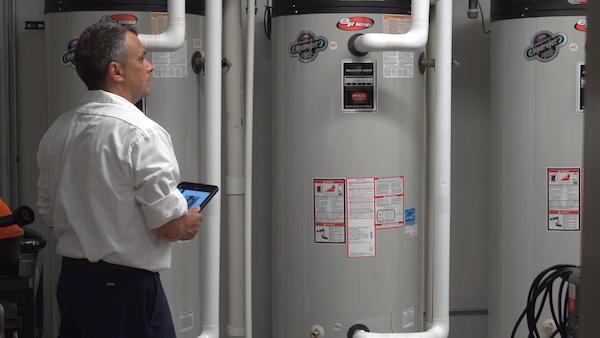
MH: How do you as manufacturers work with customers who are dealing with longer lead times and/or higher prices? Is it a matter of open lines of communication?
Carnevale: Each manufacturer deals with it differently. Our team has communicated very openly with customers when issues arise, or even when we expect issues to arise so that our customers can have the most time and information to make appropriate adjustments in their operations. So, yes, transparent communication is the best way to deal with rapidly changing conditions.
MH: It seems that in today’s employment landscape, it’s hard to find good labor, whether it’s truck drivers, waiters at restaurants, etc. In our industry, how do we continue the fight to highlight the trades as a great career choice?
Carnevale: Very true. The restaurant where I had lunch this afternoon had a sign on their entrance door that read: “Every business is short on labor. Please be kind to those who showed up to work!” That really sums up the current labor environment.
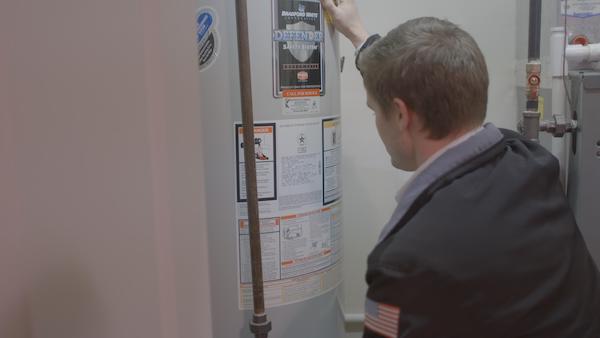
As everyone in our industry knows, the labor shortage was our biggest challenge before COVID, and it will continue to be post-COVID. There are many industry initiatives working to position the trades as a great career choice, and many companies in our industry are working diligently to promote the trades as well. I still believe what we are missing is a well-funded, well-coordinated public/private message with a big voice and a clear message that would connect with younger audiences. While we continue to work towards that, Bradford White will continue our initiatives, and 2022 we will be launching an entirely new foundation designed to promote our industry and attract new people.
MH: In spite of COVID, people must move on. How has your company evolved—or continued to march forward—over the past two years, and talk about any new initiatives, expansions, etc.
You’re right, organizations and individuals must move on. We have found that it is very helpful to shorten the time horizon for goals and objectives, otherwise you can really get bogged down by all the negative things happening all around you. So, whereas you might have had the monthly or quarterly goals, now you have to look at them weekly, or even daily. That doesn’t mean that you don’t still have long term, strategic goals, but rather that you shift more of your focus to just getting through each day or week.
From a business philosophy perspective, we, and I think most organizations are looking at supply chain improvements and diversification. I think some of the important trends will be shortening supply chains by working with suppliers closer to manufacturing operations and reviewing the risks of just-in-time inventory models versus the overall value.
